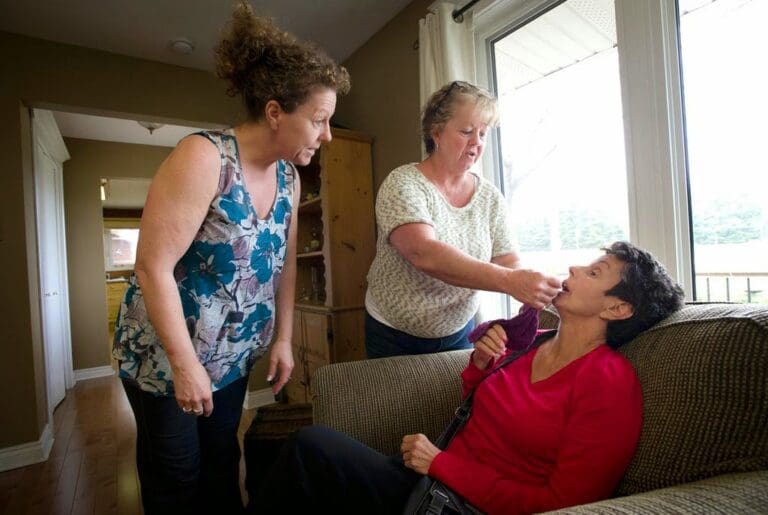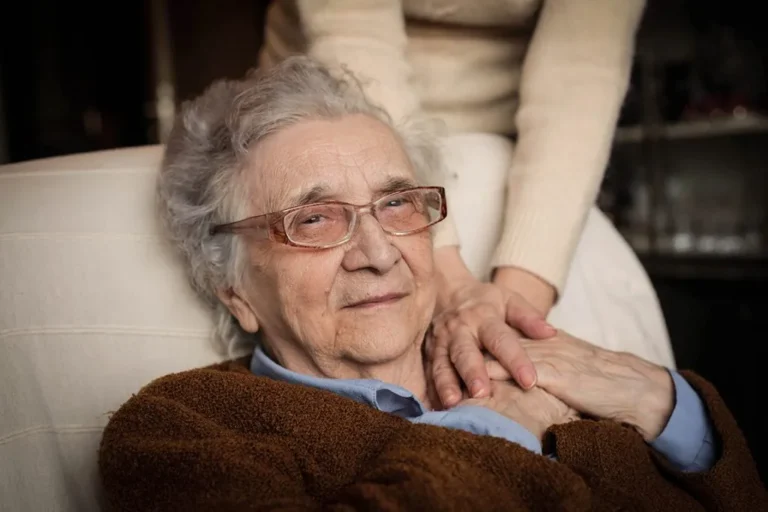Voluntary Stopping Eating And Drinking (VSED)

Voluntary Stopping Eating And Drinking (VSED)
Jay – Rosie’s Dad
At the end of life, the physical need for food and water significantly diminishes. Studies indicate that artificial nutrition or hydration has minimal impact on extending life for hospice patients. In fact, continuing to provide food and water artificially can lead to complications, such as discomfort or aspiration pneumonia. The focus shifts towards ensuring the patient’s comfort and honoring their and their family’s wishes regarding care and sustenance, often opting for natural cessation of eating and drinking.
My dad had diabetes and we kept desserts away from him. But when he went to the hospice, I started making or buying anything he felt like eating.
“Did you bring Krispy Kreme glazed donuts for me?” He asked me one day.
“I didn’t know that you wanted them,” I responded.
“But I called you several times today to remind you.” I looked at my phone and realized the missed calls, when I must have been in the conference room at work that had a poor signal.
I felt overwhelmed, the same request for donuts once a source of frustrations and lectures was now endearing and exciting.
I told dad with a smile and a wink, we both knew I was lying, “Oh I am so sorry, I wanted to take you for a drive and buy you fresh warm donuts, do you want to go?” And off we went to get him donuts.
This was the last time my dad rode in my car. The joy on his face as he ate his favorite donut is a priceless memory that I choose to recall when I am missing him.
As my dad neared death, he became less and less interested in eating and drinking. Most days, he did not even want his well-balanced diet shakes. So, I called his hospice physician to discuss what I should do. He told me to respect his wishes and not force feed him.
“The lack of food and water will slow down his brain function, relax him and let him move on in peace,” he told me. Accepting that providing nourishment at this stage of his life was counterproductive and was prolonging his misery was so contrary to what we had done with my dad for years. A couple of days after he stopped eating and drinking, he went into a coma.
Sitting by dad’s bedside in those last days, I reflected on the journey we had shared. The decision to withhold food and water, initially fraught with guilt and doubt, had evolved into a testament to my unwavering commitment to ensuring his peace and comfort.

A Chef’s Bittersweet Taste
Harvey and Tabitha’s Story
Harvey admired his wife, Tabitha. She was once a renowned chef with an extraordinary talent for turning simple ingredients into culinary masterpieces. But life took a harsh turn when Tabitha became gravely ill. The woman who had always been a force of nature, commanding the kitchen with effortless ease, now struggled to mask her weariness.
One evening, as Harvey chopped vegetables, Tabitha wheeled herself into the kitchen, her footsteps slower, her once bright eyes now dull. “What are you making?” she asked softly.
“Your favorite, minestrone,” Harvey replied, forcing a cheerful tone as he stirred the pot.
Tabitha smiled weakly. “Let me help.”
Harvey hesitated. “You should rest, Tabitha.”
“I want to,” she insisted, reaching for a knife and an onion with a determined hand.
Cognizant of his wife’s shakiness, Harvey gently guided Tabitha to the table and offered, “Why don’t you help me peel the garlic?” Tabitha struggled to crack apart the cloves, but she managed to do so, her love for cooking driving her on. Harvey watched her with a mix of admiration and sorrow, knowing how much joy this brought her despite her condition.
As they sat at the table, Tabitha managed only a few spoonfuls before pushing the bowl away. “I’m sorry, Harvey. I just can’t eat.”
Harvey’s heart ached. “It’s okay, Tabitha. You did great.”
As Tabitha’s illness worsened, her appetite dwindled further. Harvey found himself in a constant state of worry, torn between wanting to nourish her and respecting his wife’s wishes. One night, after another meal left untouched, Harvey couldn’t hold back. “Tabitha, please, you need to eat something. Anything.”
Tabitha looked up at her husband, her eyes filled with a mixture of sadness and resignation. “Harvey, I’m not hungry. I haven’t been for a while.”
He took a deep breath, running his hands through his hair. “I know, but it’s hard to see you like this.”
She reached out, placing her warm hand on top of his. “I just want to enjoy making food with you, even if I can’t eat it.”
The decision to stop urging Tabitha to eat was excruciating but the advice of the hospice physician echoed in Harvey’s mind. “Respect her wishes. Forcing her to eat will only prolong her suffering.”
Harvey always believed in the power of good food to heal and bring comfort. But now, he had to accept that providing nourishment at this stage of her life was counterproductive.
Sitting by Tabitha’s bedside, Harvey reflected on their journey. “Remember the first dish we cooked together?” he asked, a smile tugging at his lips. Tabitha nodded weakly. “Chicken Marsala. You overcooked the chicken, but it was still the best meal because we made it together.”
They laughed softly, reminiscing about the countless meals they had shared. Despite the pain, these moments brought them closer, reaffirming their love.
One afternoon, Tabitha asked Harvey if they could make her famous chocolate soufflé. “Are you sure you’re up for this?” Harvey asked, concerned.
“Yes, I need to do this one last time,” Tabitha insisted.
Harvey gathered the ingredients and they began. Tabitha’s hands shook, and she had to rest frequently, but she was resolute. As they worked, Harvey couldn’t help but marvel at her resilience.
The soufflé was perfect, rising beautifully in the oven. Tabitha managed a small bite, savoring the taste. “It’s just as I remember,” she said, tears in her eyes.
Harvey kissed her forehead. “I love you, Tabitha.”
In her final days, Tabitha continued to experiment in the kitchen, her passion for cooking undiminished. They spent those precious moments together, not as patient and caregiver, but as husband and wife, sharing their love for food one last time.

The Last Thanksgiving
Lily and Aaron’s Story
Lily and her brother Aaron shared a bond that transcended distance. Despite living across the country from each other, they made it a point to spend Thanksgiving and Christmas together every year. It was a tradition that had lasted for decades, filled with laughter, memories, and Aaron’s favorite holiday meals.
This year, however, was different. Aaron’s health had been deteriorating, and the effort to meet was a struggle. When Thanksgiving finally arrived, Lily was both excited and anxious. She noticed Aaron’s frail appearance immediately when he walked through the door.
“Aaron, you made it!” Lily exclaimed, hugging him tightly.
“Wouldn’t miss it for the world,” Aaron replied with a tired smile.
Dinner was a grand affair, as always. The table was laden with all their favorite dishes. But as they sat down to eat, Lily noticed Aaron barely touched his food.
“Aaron, you haven’t eaten much. Let me make you a big plate,” she offered, her voice tinged with concern.
Aaron shook his head. “I’m not hungry, Lily.”
She frowned, knowing how much Aaron loved Thanksgiving meals. “Are you sure? I made all your favorites.”
“I’m sure,” he said softly, his eyes betraying a sadness that matched her own.
After dinner, Lily pulled Aaron aside. “What’s going on, Aaron? You’ve hardly eaten anything.”
Aaron sighed, looking down at his hands. “Lily, my illness… it’s taken away my appetite. I just don’t feel like eating anymore.”
Tears welled up in Lily’s eyes. “But you always loved Thanksgiving. This isn’t like you.”
“I know,” he said gently. “But it’s the reality now. I’m tired, Lily. Really tired.”
Lily hugged him tightly. “I just want you to be okay.”
“I know, and I appreciate it. But sometimes, the best thing is to accept things as they are,” Aaron whispered.
As the days passed, Lily watched as Aaron’s condition worsened. She realized that his refusal to eat was part of his body’s way of letting go. It was a difficult truth to accept, but she knew she had to honor his wishes.
On the last night of their visit, they sat together, reminiscing about past holidays. “Remember that one Thanksgiving when we accidentally set the tablecloth on fire?” Aaron chuckled.
Lily laughed, tears streaming down her face. “How could I forget? Mom was so mad!”
They talked late into the night, cherishing every moment. Lily understood that this might be their last holiday together, but she was grateful for the time they had.
“Thank you for being here, Aaron,” she said softly.
“Thank you for always making it special, Lily,” he replied.
Their bond, strengthened by years of shared memories, remained unbroken even as they faced the inevitable.
The next morning, Lily found Aaron in his favorite chair, looking out the window. “Morning, Aaron,” she said, bringing him a cup of tea.
“Morning,” he replied, his voice barely above a whisper.
They sat in comfortable silence for a while, watching the snowfall gently outside. “I love the first snow,” Aaron said quietly. “It’s peaceful.”
Lily nodded, squeezing his hand. “It is.”
As the day went on, Aaron grew weaker. Lily stayed by his side, talking to him, sharing stories, and holding his hand. She could see the exhaustion in his eyes, and it broke her heart.
“Aaron, it’s okay,” she whispered. “You can rest now.”
He looked at her, a tear rolling down his cheek. “I love you, Lily.”
“I love you too, Aaron,” she replied, tears streaming down her face.
That evening, Aaron slipped into a deep sleep, and by morning, he was gone. Lily sat by his side, holding his hand, grateful for the time they had spent together.
She knew that their bond would never fade, and the memories of their Thanksgivings would always be a source of comfort. Lily looked out the window at the gently falling snow, feeling a sense of peace knowing that Aaron was finally at rest.


